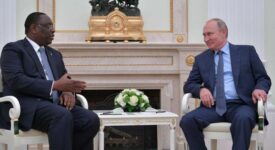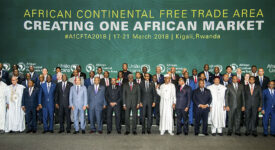2020 seemed set to be “a pivotal year” for EU-African relations, with the 10th Commission-to-Commission meeting between the EU and African Union (AU) held in February, followed by a renewed comprehensive EU Strategy with Africa published in March. However, with the planned 6th African Union-European Union Summit now postponed due to the COVID-19 pandemic, the leaders should use the upcoming months to forge a true strategic partnership which goes beyond the archaic donor-recipient relationship. Only then can EU-Africa relations become a building block in Europe’s quest to obtain geopolitical power, and can Africa fully benefit from its longstanding yet so far disappointing relationship with Europe.
During the Juncker Commission, the focus on Africa was framed by the EU’s ‘migration crisis’, and hoped that access to money, creating jobs and accelerating economic growth would stem the rise in African migration to Europe. Under the aegis of the current Commission, Africa has ostensibly become a cornerstone of Europe’s geopolitical aspirations. The fact that von der Leyen‘s first foreign trip to AU headquarters in Addis Ababa took place less than a week after the new president of the European Commission assumed office is a clear testament of Africa’s growing strategic relevance for the EU’s foreign policy agenda. This strategic shift towards Africa is also underpinned by a plethora of recent diplomatic initiatives by EU member states, including Germany’s Marshall Plan with Africa (2017), and former President Juncker’s call for an Africa–Europe Alliance for Sustainable Investment and Jobs (2018).
Europe’s renewed interest in Africa comes at a critical moment for global geopolitical competition, EU-Africa relations, and the African continent itself. Despite immense challenges, Africa is increasingly perceived as a continent of opportunities. In addition to an abundance of natural resources, Africa’s high demographic and economic growth rates in the last two decades have contributed to this new narrative of Africa. Moreover, it has gained further momentum thanks to the AU’s institutional reform process, and particularly the establishment of the African Continental Free Trade Area (AfCFTA). However, Africa’s growing geostrategic significance has also triggered a “new scramble” for the continent’s emerging market, natural resources and votes in international institutions, particularly the UN. Both traditional and new powers, such as China, the US, India, Russia, Turkey, and the Gulf states, are racing to increase their political, economic and military footprints on the continent. With this burgeoning great power competition, Europe is no longer the only game in town.
Against this backdrop, the Union’s renewed interest in Africa should also be understood as an attempt to catch up with the ongoing transformative processes and changing power dynamics on the continent. While the current crisis may provide a unique opportunity to boost some of the key priorities outlined in the comprehensive EU Strategy with Africa (e.g. digitalisation, green transition), it also underlines the need to move EU-Africa relations into a bold, new direction. Clinging on to an outdated, North-South aid-driven relationship will no longer suffice to face the challenges created by COVID-19. European and African leaders should seek to develop and spell out a more political and strategic relationship, based on these new realities.
Firstly, a renewal of the AU-EU partnership must consider the problems exacerbated by COVID-19 that has taken a toll on the continent’s economies and threatens to reverse years of progress. Sub-Saharan Africa is experiencing its first economic recession in 25 years. Beyond the EU’s pledge to provide €3.25 billion from existing external action resources to Africa under the Team Europe response package, the question of further debt relief will be of utmost importance in the upcoming months. In 2019, a third of the countries in Sub-Saharan Africa were already in debt distress, or at high risk of debt distress. The Group of 20’s Debt Service Suspension Initiative, launched in April 2020, is a first step in the right direction, though this move only postpones debt service obligations and does not apply to the private sector. To avoid another ‘lost decade’ like the 1980s, the EU and other international stakeholders and actors should push for substantive debt cancellation for African countries.
Secondly, the COVID-19 crisis also offers an opportunity to forge a relationship built on mutual interests. The bitter truth is that African and European interests on various issues differ greatly, including international criminal justice, agricultural policies, governance and values, and, above all, migration. As economic transformation is now at the heart of African integration efforts, not security, supporting the implementation of AfCFTA should therefore be a top priority of the future AU-EU joint strategy. The AfCFTA will not only be a central pillar of Africa’s post-COVID-19 recovery but also represent a major opportunity to overcome the traditional donor-recipient relationship. Finally, the EU must streamline parallel policy frameworks for approaching Africa and African countries, namely the OACPS-EU partnership (which does not include North Africa) and the European Neighbourhood Policy (ENP). These overlapping forms of cooperation have caused three significant obstacles for the future of EU-Africa relations.
First, the simultaneous application of OACPS and ENP frameworks remain a major impediment to Africa’s regional and continental integration as they contribute to the political fragmentation among African countries in their relations with Europe. Second, on the EU side, the competing frameworks are increasingly inconsistent with the idea of an integrated and comprehensive European approach to Africa. Third, and most importantly, upholding the 45-year-old OACPS-EU framework stands at odds with the declared objective of moving beyond donor-recipient relations towards a genuine partnership with Africa. The OACPS embodies the traditional aid-centred relationship between the two continents like no other institution. In order to form a truly strategic, continent-to-continent approach, the EU should further support the integration efforts of the AU and Regional Economic Communities instead – not least in its enlightened self-interest.
Africa’s transformation presents the EU with both an opportunity and a challenge: it may either diminish Europe’s role in the global power contest further or, on the contrary, pave the way for its geopolitical ambitions. Though still being Africa’s primary trading partner and source of foreign investment and development aid, with its geostrategic landscape shifting rapidly, Europe risks losing credibility and influence in its wider southern neighbourhood if it does not recognise the changing nature of their relationship. Building a partnership that exceeds a donor-recipient relationship requires recognising the non-equal footing of the EU and Africa and acknowledging the economic and power asymmetry that continues to persist. Only then can EU-Africa relations move to the next level: a truly strategic partnership.
‘Europe’s Pivot to Africa: Shaping the Future of the Strategic Partnership’ –Commentary by Marco Zeiss – European Policy Centre / EPC.







